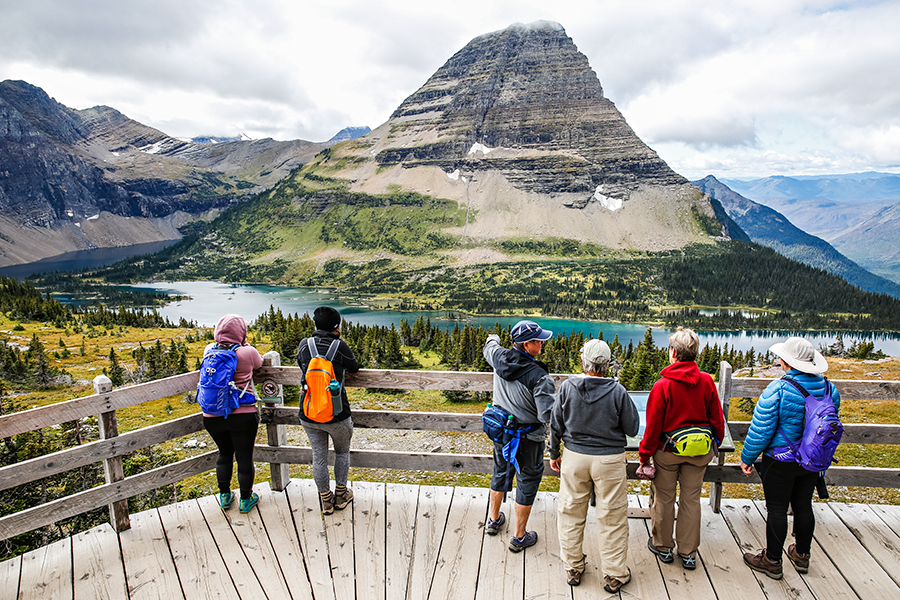Landmark Conservation Bill Gains Bipartisan Boost
Passage of historic legislation would reduce maintenance backlog in parks and permanently fund Land and Water Conservation Fund
By Tristan Scott
The conservation community was crestfallen earlier this year when President Donald Trump laid out a budget plan calling for steep cuts to both the Land and Water Conservation Fund (LWCF) and the National Park Service, leaving the popular programs endangered even as Montana’s senators pledged their continued support.
Less than a month later, the slumping spirits of sportsmen, public land advocates and outdoor recreation enthusiasts were buoyed as a bipartisan coalition of more than a dozen senators announced a conservation initiative that dedicated billions of dollars to public lands, including requiring full, mandatory funding of LWCF and big-ticket fixes to the maintenance backlog plaguing national park units.
On June 17, the U.S. Senate voted 73-25 to pass the Great American Outdoors Act, igniting a celebration among public lands stakeholders and signaling a rare bipartisan conservation triumph in an age of partisan gridlock.
“Without a doubt, this is a huge step forward to fund Montana’s outdoor heritage for the future generations,” Whitney Tawney, deputy director of the Montana Conservation Voters, said.
In addition to securing $900 million annually for the LWCF, the bill also invests $1.9 billion annually for the next five years to address the maintenance backlog on National Park Service, U.S. Forest Service, U.S. Fish and Wildlife Service, and Bureau of Land Management lands.
First established by Congress in 1965, LWCF is funded by offshore oil and gas royalties rather than taxpayer dollars and provides hundreds of millions of dollars in funding to protect public lands and increase access to outdoor recreation, which sustains an estimated 71,000 Montana jobs and generates more than $7 billion in economic activity statewide every year.
The outdoor recreation sector’s role as a prominent economic driver has been a major factor in building support, and business leaders from the outdoor sector and beyond have called on Republican leaders to fight for full funding.
Still, despite wide support for LWCF, it has received full funding only once in its history, and proponents have been pushing lawmakers to pass legislation to authorize annual allocations of up to $900 million — the full amount allowed.
The Great American Outdoors Act does that and more, spending about $2.8 billion per year on conservation, outdoor recreation and park maintenance.
“America’s hundreds of millions of acres of public lands are the result of hundreds of years of exploration and conservation,” Senate Majority Leader Mitch McConnell, R-Kentucky, said in a statement.
U.S. Sen. Steve Daines, R-Montana, has emerged as a prominent leader of the latest measure to ensure access to and protection of public lands, while U.S. Sen. Jon Tester, D-Montana, has been advocating for full and permanent funding for more than a decade, and has introduced a bill to fully fund LWCF every year since 2009.
Daines, working in concert with other prominent Republicans, including U.S. Sen. Cory Gardner, R-Colorado — both of them vulnerable Republican incumbents in an election year — persuaded Trump to support the bill even after the president called for slashing funding in his budget proposals.
“We sat down and shared pictures with President Trump of our public lands in Colorado and Montana and he committed to doing it,” Daines said. “As a city that is very polarized, once again it has taken public lands to bring a divided government together.”
McConnell urged the House to pass the measure without delay, and U.S. Rep. Greg Gianforte, Montana’s lone congressional representative and the Republican nominee for governor, has endorsed the bill and pledged his support.
“Our public lands are part of the foundation of our Montana way of life,” Gianforte said. “As someone who raised his kids on our public lands and who successfully championed making LWCF permanent, I support the historic Great American Outdoors Act that’s poised to pass the Senate, and I urge the House to consider it.”
Groups like the Montana Conservation Voters have been mounting pressure on Republican lawmakers to fully fund LWCF for months, and are acutely aware that election-year politics plays a role in advancing measures like the Great American Outdoors Act, which might not have otherwise emerged as a priority.
For his part, Daines noted bipartisan efforts to secure funding for LWCF in years past as evidence that the public lands measure transcends politics, calling it the “most important conservation legislation” in at least a half-century.
Will Shafroth, president and CEO of the National Park Foundation, the official nonprofit partner to the National Park Service, cheered the Senate’s passage of the legislation, noting that 70 percent of its $9.5 billion maintenance backlog funding portion is dedicated to parks.
“The National Park Foundation has been a strong advocate of efforts to address and reduce the backlog of deferred maintenance in our national parks,” according to Shafroth. “We are excited by the recent activity in Congress and are in complete support of the Great American Outdoors Act. We look forward to working with Congress to get this historic legislation across the finish line.”
Other conservation stakeholders who voiced support for the measure included Land Tawney, president and CEO of Backcountry Hunters and Anglers, which counts Donald Trump Jr. among its members.
“Today we thank the senators who heeded the call to establish a legacy of conservation stewardship now and for future generations. This moment should not be overlooked,” Tawney said. “We now urge members of the House of Representatives to follow through on their promise and swiftly advance the Great American Outdoors Act to the president.”